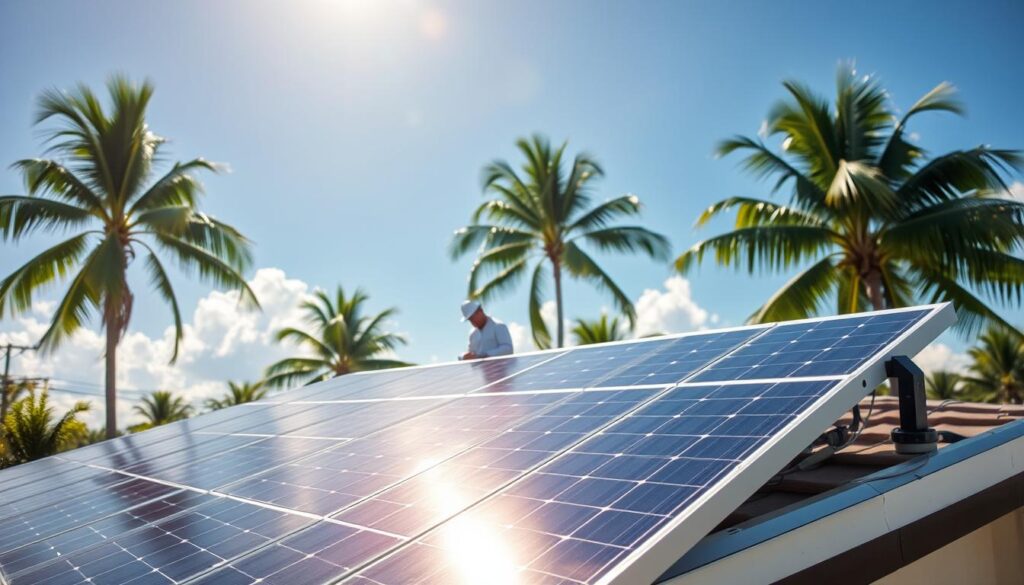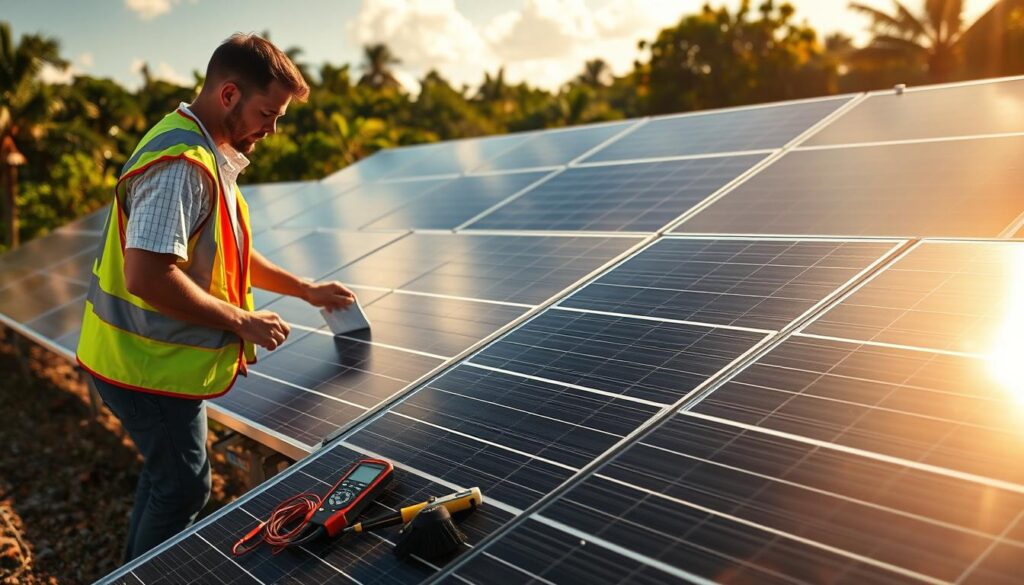Florida’s sunny climate makes buying solar panels florida a top choice for homeowners. With 230 days of sunshine yearly and 5–6 peak sun hours daily, solar energy is both practical and cost-effective. The average 5kW system costs $10,548 before incentives, dropping to $7,384 after the 30% federal tax credit. This makes selling solar panels in florida a booming market, offering savings up to $69,799 over 25 years.
Prices vary by system size. A 3kW system starts at $6,329, while 10kW systems cost up to $21,097 pre-incentives. Florida’s incentives, like net metering and PACE financing, help reduce upfront costs. Compare quotes to save up to 20%—and choose installers with 5+ years’ experience and a certified CV license.
Key Takeaways
- Average 5kW system cost: $10,548 before incentives, $7,384 after tax credit.
- Prices range from $8,966 to $12,130 for 5kW installations.
- 30% federal tax credit applies to purchases, lowering total costs.
- 25-year savings can reach $69,799 for a 5kW system.
- Comparing quotes from installers saves up to 20% on your purchase.
Why Florida is Ideal for Solar Energy
Florida’s sunny climate and supportive policies make it a top destination for solar adoption. With over 230 sunny days annually, the state harnesses 5-6 peak sun hours daily, maximizing energy production. This sunlight translates to real savings and environmental progress for homeowners.
Abundant Sunshine Year-Round
Florida’s nickname, the “Sunshine State,” isn’t just a title—it’s a resource. Year-round sunlight means solar systems operate efficiently even in winter. For example, a 5kW system can generate enough energy to offset most monthly electricity use.
Energy Savings for Homeowners
Switching to solar reduces utility bills fast. A 5kW system saves homeowners $235 annually in property taxes alone due to Florida’s Solar Property Tax Exclusion. Over 25 years, these savings add up to $69,799. Here’s how it breaks down:
| Savinging Type | Annual Savings |
|---|---|
| Electricity costs | $1,200+ |
| Sales tax exemption | Up to $1,440 |
| Long-term ROI | $21,632 over 25 years |
Environmental Benefits of Solar Energy
Choosing the best solar panels florida reduces reliance on fossil fuels. Solar energy cuts carbon emissions by an average of 3-4 tons yearly per home. As
Florida Power & Light reports
, widespread adoption could slash the state’s CO₂ output by 15% by 2030.
Florida’s solar energy companies are leading this shift. With over 14,000 megawatts already installed, the state ranks third nationally in solar potential. Yet, only 5% of energy comes from solar—leaving huge room for growth.
Understanding Solar Panel Technology
Choosing the best solar panels Florida offers starts with knowing how they turn sunlight into power. Solar panel installation florida experts explain how each component works together to maximize energy output in Florida’s unique climate.
How Solar Panels Work
Photovoltaic (PV) cells in panels absorb sunlight, creating direct current (DC) electricity. Inverters then convert this into alternating current (AC) for home use. Even in Florida’s hot, humid weather, modern panels maintain efficiency through cooling designs and anti-reflective coatings.

Types of Solar Panels Available
- Monocrystalline: High efficiency (up to 22%) and space-saving for Florida rooftops.
- Polycrystalline: Cost-effective option with 15-17% efficiency, ideal for larger roof spaces.
- Thin-film: Flexible panels for unconventional surfaces, though less efficient (11-13%).
Most systems use 400-watt panels with 19% efficiency, balancing cost and performance in Florida’s heat.
Innovations in Solar Technology
Leading brands now offer bifacial panels that capture sunlight from both sides. Solar roof tiles blend seamlessly into roofs, while smart inverters optimize energy output. Florida Power & Light’s 4 GW energy storage goal by 2033 supports advancements like high-density panels and lithium-ion battery integration.
Key Regulations and Incentives in Florida
Going solar in Florida doesn’t just mean saving energy—it means accessing a network of programs that can slash costs. From tax breaks to cash-back rebates, these florida solar panel incentives simplify your transition to clean energy. Let’s break down how you can maximize savings legally and financially.
Federal Tax Credits for Solar
Uncle Sam rewards solar investments with the 30% Federal Solar Tax Credit, coveringable through 2032. For a $30,000 system, that’s $9,000 off your taxes. The credit drops to 26% in 2033, so act soon.
- 2017–2023: 30% credit
- 2033: 26%
- 2035: Ends for residential
State-Specific Incentives
Florida’s policies ensure solar stays affordable:
- No sales tax on equipment (saving 6% instantly)
- No property tax hikes for solar additions
- Net metering since 2008: Sell unused energy back at full retail rates
These rules keep costs low without complicating home valuations.
Local Rebates and Programs
Counties and cities amplify savings with targeted deals like:
- Boynton Beach: $1,500 rebate for systems ≥5kW
- Dunedin: $2,500 max grant for solar panels
- Orlando OUC: $2,000 battery rebates
Check utility websites for regionalsolar panel rebate floridaoffers.
Choosing the Right Solar Panel Provider
Choosing the right solar energy company florida starts with evaluating experience, certifications, and customer feedback. Florida’s growing solar market offers options like selling solar panels in florida through reputable firms such as Demand Construction, Solar Optimum, and Tampa Bay Solar. Follow these steps to pick a trusted partner.

Factors to Consider When Selecting a Company
- Verify Florida CVC licensing and NABCEP certifications for installers.
- Choose providers with at least five years of experience and 20-year system warranties.
- Local companies like Roof & Air or BeeGreen Solar often have deeper knowledge of state regulations and hurricane-resistant designs.
- Compare quotes from certified companies to avoid hidden fees or rushed timelines.
Reviews and Ratings You Should Check
Look for consistent 5-star ratings on SolarReviews or Google. Top-rated companies such as Transform Solar and PRIME Green Solutions often have hundreds of positive reviews highlighting their reliability. Watch for red flags like unresolved complaints about delayed installations or poor service.
Questions to Ask Your Solar Installer
- Do your installers hold NABCEP certification?
- What’s the projected energy output for my home?
- Does your warranty cover both equipment and labor defects?
- Will you handle permitting and inspections?
- What financing options are available for selling solar panels in florida?
Local providers like Affordable Solar often offer tailored solutions, while national firms may subcontract work. Prioritize transparency, long-term support, and warranties to ensure your system performs for decades.
Financing Options for Solar Panel Installation
Going solar can seem daunting due to upfront costs, but Florida offers diverse solar panel financing florida options to make installations affordable. The average solar panel cost florida starts around $33,091 before tax credits, but programs like BrightSave™ and loans from institutions like Ygrene and Home Run Financing simplify payments. Explore your choices to find the best fit for your budget.
Cash Purchase vs. Financing Plans
Paying upfront with a cash purchase offers long-term savings, but solar panel financing florida alternatives exist for most budgets. BrightBuy™ lets you own systems outright, while loans like SELF’s 5–9.5% fixed-rate loans (minimum credit 500) spread costs over time. Options like Suncoast Credit Union’s 20-year terms give flexibility.
- Cash purchase: Full ownership, tax credits applied immediately
- Loans: Terms up to 20 years, 0% down via programs like BrightSave™ Monthly
Leasing Solar Panels: Pros and Cons
Leasing or PPA agreements let you install panels with $0 down. BrightSave™ Prepaid includes free maintenance and 24/7 monitoring, but lessees don’t qualify for tax credits. Selling a home with a lease requires transferring the contract to the new owner.
PACE Financing in Florida
PACE financing ties payments to property taxes, requiring 10% equity and 3 years of tax compliance. Ygrene and RenewPACE offer loans up to $35,000 for grid-tied systems. Repayments stay with the property, not the owner, making it ideal for long-term residents.
The Installation Process Explained
Planning solar panel installation florida involves clear steps to ensure your system operates safely and efficiently. Whether you buy solar panels florida or lease, knowing the process helps manage expectations and ensures compliance with local codes.
What to Expect During Installation
Start with a site assessment to evaluate roof conditions and sunlight exposure. Installers check structural integrity, especially in hurricane-prone areas. Permits are secured next, followed by hardware setup. Panels are mounted, connected to inverters, and linked to your electrical system. Safety checks confirm no leaks or damage.
Timeline for Installation
- Initial consultation: 1-2 hours with a provider
- Site survey: 30 minutes via virtual or on-site visits
- Permitting: 2-4 weeks (varies by county)
- Physical installation: 1-2 days by certified crews
- Final steps: 1-2 weeks for inspections and utility approvals
Post-Installation Steps
After setup, a city inspector verifies safety standards. Utility companies install bi-directional meters to track energy flow. Once approved, your system is activated instantly. Use the Palmetto App to monitor production daily. Schedule yearly cleanings to maintain efficiency, and contact installers for any roof-related concerns post-installation.
Maintenance and Upkeep of Solar Panels
Maintaining solar panels in Florida is straightforward but requires attention to the state’s unique climate. Regular upkeep ensures systems run efficiently for decades. Proper care extends the 25–30 year lifespan of panels and maintains energy savings. Let’s explore simple steps to keep your investment performing at peak capacity.

Routine Maintenance Tips
Florida’s weather demands smart upkeep to avoid issues. Start with:
- Clean panels gently—use soft cloths and water. Coastal areas may need more frequent cleaning due to salt buildup.
- Trim nearby trees to prevent shading. Shady spots reduce output by up to 30%.
- Check connections annually with a certified technician to avoid electrical issues.
Professional cleaning services cost $100–$300, while annual inspections start at $150. Choose installers like Florida Power Services, with 17+ years of experience in solar panel installation florida, to avoid roof leaks caused by improper flashing.
Monitoring Your Solar Energy Production
Track performance via apps linked to your system. Sudden dips in output signal problems. During hurricane season, inspect for storm damage like cracked glass or loose mounts. A 10% drop in output might mean:
- Dirty panels
- Inverter malfunction
- Loose wiring
Common Issues and Solutions
| Issue | Cause | Solution |
|---|---|---|
| Inverter failure | Power surges or aging components | Replace every 10–15 years ($1,000–$2,000). Most warranties cover defects.) |
| Output drops | Pollen, debris, or shading | Clean panels or trim vegetation |
| Roof leaks | Poor installation | Use flashed mounting hardware during best solar panels florida installation to seal seams. |
Most issues take 1 hour to resolve. Avoid DIY repairs for electrical components. Regular checks prevent costly replacements, like inverters needing early replacement due to neglect. Prioritize quarterly cleanings in areas with heavy pollen or salt exposure.
Maximizing Your Solar Investment
Turn your solar panels into long-term savings with smart strategies. Florida’s sunny climate and policies make it easier than ever to maximize returns when buy solar panels florida. Let’s explore how to get the most from your investment.
“Solar installations can increase home value by approximately 4%.” – Zillow Report
Understanding Net Metering
Florida’s net metering ensures unused energy earns credits. If your system generates 1,000 kWh but you use 800, you gain a 200 kWh credit. Excess energy sent back to the grid translates to lower bills. This is especially valuable in summer when production peaks.
Battery Storage Solutions
Backup batteries protect against outages and boost savings. A 10kWh battery costs around $13,000 before incentives, but federal and state perks cut this price. Here’s how incentives reduce costs:
| Component | Original Cost | After Federal Tax Credit (30%) |
|---|---|---|
| 10kWh Battery | $13,000 | $9,100 |
Florida also waives the 6% sales tax, saving an extra $780. Pairing batteries with solar panel cost florida discounts makes them affordable for hurricane-ready homes.
Using Energy Efficient Appliances
Combine solar with energy-smart choices to cut usage and system size. Try:
- LED lighting
- Energy Star® rated appliances
- Smart thermostats
Florida utilities offer time-of-use rates—run appliances during off-peak hours to save more. Every watt saved reduces system needs, lowering initial solar panel cost florida.
Customer Success Stories in Florida
Homeowners and businesses across Florida are proving that selling solar panels in florida delivers real-world benefits. Real stories show how florida solar panel incentives and smart investments are transforming energy use statewide.
Case Study: Homeowner Savings
A 5kW system in Orlando reduced one family’s energy costs by 90%. Over 25 years, they saved $69,799, with a payback period of 8 years. “The first year cut our bills by $3,000!” said Maria Lopez of Tampa.
| Facility | Monthly Savings |
|---|---|
| Tampa MAACO | $1,800–$2,000 |
| Brandon MAACO | $1,500–$1,700 |
| Combined Annual Savings | $40,000+ by 2025 |
Business Success: MAACO Facilities
“Solar isn’t just eco-friendly—it’s a smart business move.”
Ivan Montoya of Tampa Bay Solar installed 515 panels across two MAACO shops. His facilities now save $3,300 monthly. Over 20 years, his three locations could save $800,000. “Electricity costs rise 3% yearly—solar locks in savings,” Montoya explained.
Community Solar Programs
Communities like Sarasota’s solar co-op let residents pool resources. Participants saved 25% on energy costs without upfront costs. Florida’s florida solar panel incentives made these programs possible.
Whether you’re a homeowner or business owner, solar success stories prove the value of selling solar panels in florida. Explore incentives today to start your journey.
Frequently Asked Questions About Solar Energy
Curious about solar energy’s practicality in Florida? Here’s what residents often ask:
How Long Do Solar Panels Last?
Most panels come with 25-year warranties and last up to 30 years. Florida’s heat can slightly reduce efficiency over time, but regular maintenance keeps systems running strong. Check rebates like solar panel rebate florida to offset long-term costs.
What Happens During a Hurricane?
Modern systems are built to withstand 140 mph winds. Proper installation by a trusted solar energy company florida ensures stability. Insurance may cover damage, so review policies before storms.
Can Solar Power Work on Cloudy Days?
Yes! Panels still generate energy in cloudy weather—just at 10–25% of peak capacity. Florida’s 5–6 peak sun hours daily mean consistent output. Net metering balances production gaps.
Choosing the Right System Size
| Home Size (sq ft) | Solar System Size (kW) |
|---|---|
| 1,500 | 8–11 kW |
| 2,000 | 10–13 kW |
| 2,500 | 12–15 kW |
| 3,000+ | 14–21+ kW |
Still unsure? Contact a solar energy company florida to assess your home’s needs. Take advantage of state incentives like the solar panel rebate florida to make solar more affordable.
Environmental Impact of Solar Energy in Florida
Solar energy companies in Florida are pivotal in curbing climate change. By selling solar panels in Florida, these businesses help slash emissions while preserving the state’s natural beauty. With 230 sunny days yearly, solar power offers a clean alternative to fossil fuels.
Switching to solar cuts carbon emissions dramatically. A state-wide shift to solar could reduce greenhouse gases by 1.8–3.1 million tons annually—equivalent to removing 118,000 cars from roads. Solar energy companies in Florida are key to this progress, offering solutions for homes and businesses.
- Water savings: Solar panels don’t use water for cooling, unlike coal or gas plants. This protects water supplies in regions like Orlando, where solar projects already save over $400,000 yearly in energy costs.
- Resource protection: Every megawatt of solar energy reduces reliance on finite fossil fuels. Florida’s solar potential could add 1,165–1,942 MW to the grid, cutting coal and gas demand.
- Long-term benefits: Solar panels last 25–30 years, providing decades of clean energy. Systems often pay for themselves in 3–5 years, making them a smart eco-friendly investment.
Sustainable living in Florida starts with solar. Every installation helps combat rising sea levels and extreme weather. Solar energy companies in Florida are making this possible, while creating jobs and lowering electricity bills. Choosing solar aligns with protecting the state’s ecosystems and ensuring a greener future for generations to come.
Future of Solar Energy in Florida
Florida’s solar energy landscape is poised for significant growth, driven by technological advances and shifting policies. As the state nears 250,000 installations, experts predict Florida could become the nation’s top residential solar market by 2028. This expansion hinges on affordable florida solar panel incentives and solar panel financing florida options, which are making systems more accessible for homeowners.
Market Growth Predictions
With 30,000 new installations in 2024 alone, the industry shows no signs of slowing. Falling costs—like the $24,472 average system price after federal tax credits—make solar a smart choice. Innovations in battery storage and smart inverters will further boost adoption, especially in regions facing frequent storms.
Upcoming Technological Advancements
Emerging tech like solar roof tiles and transparent windows could redefine home design. Companies like Tesla’s Solar Roof and SunPower’s high-efficiency panels are already available. Florida’s 237 sunny days annually pair well with these products, ensuring reliable energy even during cloudy periods.
Role of Policy in Solar Expansion
State policies like net metering and programs from FPL and TECO continue shaping the market. While proposed bills like SB 1024 threaten existing incentives, grassroots support for solar remains strong. Homeowners saving an average of $171 monthly are pushing utilities to expand programs like FPL’s SolarTogether. As climate resilience grows urgent, solar plus storage systems will become standard, especially in hurricane-prone areas.
